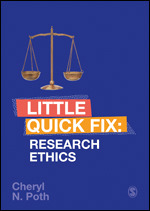Watch the Methodspace Live Webinar: Research Ethics in Practice
Research ethics was the focus for MethodSpace in March 2021.

Ethical research involves much more than a pre-study review or forms to explain how the study adheres to the institution’s rules about protection of human participants. This webinar featured a cross-cultural conversation about two key questions: How do I identify critical ethical issues for my research? and What are the practicalities of responding to ethical issues as they arise? Dr. Poth raised these questions in her Research Ethics Little Quick Fix book, and Dr. Chavez has lived them in her research, and research supervision, in a complex and fraught setting.
View the MethodSpace Live webinar with Natalia Reinoso Chavez, from the Universidad de la Sabana in Bogotá, Colombia and Cheryl Poth, from the University of Alberta Edmonton, Canada.
Meet the Panelists

Cheryl Poth
Cheryl Poth is a Professor of Educational Psychology and faculty member of the research-intensive Centre for Applied Research in Assessment and Measurement in Education (CRAME) at the University of Alberta, Canada. She conducts research, teaches, and supervises graduate students in the areas of mixed methods research, program evaluation, qualitative research, classroom assessment and health sciences education.

Natalia Reinoso Chávez
She is the author of the Little Quick Fix: Research Methods, and Innovation in Mixed Methods Research: A Practical Guide to Integrative Thinking with Complexity, winner of the 2020 Most Promising New Textbook Award from the Textbook & Academic Authors Association. Use this code, MSPACE20, for a 20% discount when you order her books from SAGE Publishing.
Natalia Reinoso Chávez is a Psychologist with a Master's degree in Education and Cultural Diversity. She is the Intercultural Education coordinator in the Intercultural Medical Study Center -Centro de Estudios Médicos Interculturales- at Colombia, where she has been supporting participatory community processes for more than 10 years, aiming to promote cultural preservation, nature conservation and well-being. Natalia is an independent qualitative researcher, intercultural consultant, and lecturer at the Medicine Faculty of the Universidad de la Sabana in Bogotá, Colombia. She recently contributed the chapter, "Challenges of a Systematization of Experiences Study: Learning from a Displaced Victim Assistance Program, during COVID-19 Emergency in Ethnic Territories in Colombia" to Researching in the Age of COVID-19Volume I: Response and Reassessment.
More Methodspace Posts about Research Ethics
Watch the recent, thought-provoking webinar focusing on the integration of generative AI tools within academic settings. The engaging guest speakers, Dr Leo Lo and Dr Tom Chatfield, delved into the significance of AI literacy for researchers, educators and students, as well as discussing best practices and ethical considerations.
Responsible Conduct of Research program from Epigeum offers vital training for maintaining integrity at every stage of the research lifecycle. In this blog, Professor Nicholas Steneck shares his experience of updating the course to reflect the evolving US research landscape.
Dr. Stommel brings clarity to the messy world of data collection on social media.
The wealth of material available online is irresistible to social researchers who are trying to understand contemporary experiences, perspectives, and events. The ethical collection and -use of such material is anything but straightforward. Find open-access articles that explore different approaches.
How to protect data when recording interviews on videoconference platforms.
The public is exposed to news stories about bad academic research behavior online. How can we counter this narrative and build credibility?
Julianne Cheek and Elise Øby, co-authors of the book Research Design: Why Thinking About Design Matters, discuss how to make decisions about what qualitative, quantitative, or mixed methods data to collect and how to do so. This post is the third of a three-part series of posts that feature ten author interviews.
Julianne Cheek and Elise Øby, co-authors of the book Research Design: Why Thinking About Design Matters, discuss how to make decisions about methodology in this collection of video interviews. This post is the second of a three-part series of posts that feature ten author interviews.
We need to think about research before we design and conduct it.
Julianne Cheek and Elise Øby, co-authors of the book Research Design: Why Thinking About Design Matters, discuss the first three chapters in these video interviews:
Chapter 1 – Research Design: What You Need to Think About and Why
Chapter 2 – Ethical Issues in Research Design
Chapter 3 – Developing Your Research Questions
Given the difficulties that emerged with the global Covid pandemic, the European Commission funded the PREPARED project. The aim of the project is to develop an ethics and integrity framework to guide researchers working to prevent and address large-scale crises. Find meeting reports, recordings, and related posts.
Some of us feel that technology is everywhere, but that is not the case for everyone. Inequalities persist. What do these disparities mean for researchers?
In the 50 years since hip hop started as African American street music and dance, it has become a global cultural phenomenon enjoyed across the world and studied by scholars. The resources listed here include ethnographic, mixed methods, content analysis, and case study research.
Ethical decisions are present throughout the process of academic writing and publishing. This collection of open-access articles offers insights about some of the issues writers face.
Learn more about the peer review processes and ideas from the field about how to improve it. Find a variety of perspectives in this collection of open-access articles.
SAGE MethodSpace partnered with Prepared to Zoom into the meeting and hear selected delegates provide statements on the difficulties of research during global crises and suggestions on how stakeholders can work together better in the future. View the recording!
Interested in Indigenous methods? Find the webinar recording and related resources in this post.
SAGE Publishing offered a free webinar during Banned Books Week. View the recording here.
Many Methodspace researchers conduct independent research, or are in situations where they do not have access to an Institutional Review Board or other ethics review options. Working with a private agency is an option, as described in this guest post.
Interested in cultural issues for researchers in global settings? Watch an interview with Safary Wa-Mbaleka and a webinar panel with Arceli Rosario.
Explore researchers' roles and practices for developing trust in this collection of open access articles.





















Informed consent is the term given to the agreement between researcher and participant. In this post Janet Salmons offers suggestions about the intersections of the Internet communications, ethics and participants.